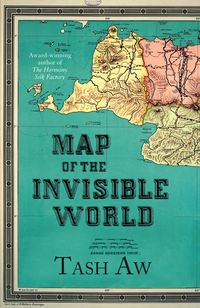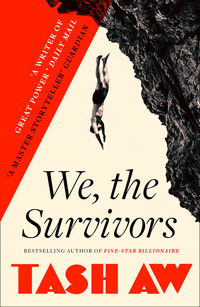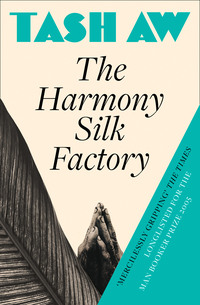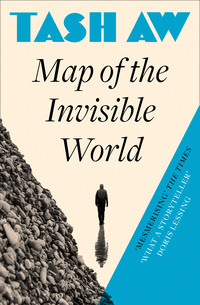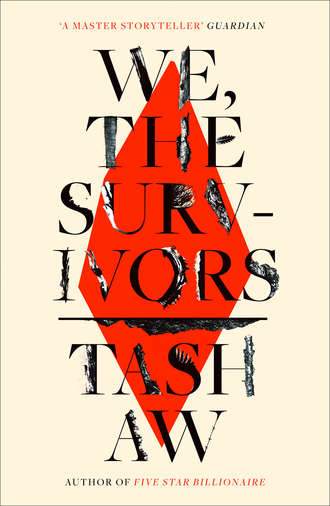
Полная версия
We, The Survivors
But I’m just talking rubbish, I said.
No, no – it’s really interesting. Please, go on.
As I spoke I couldn’t stop wondering why she was so interested in me. But I couldn’t stop talking. What’s more, to a total stranger. The way she nodded and silently wrote her notes made me feel both important and uneasy. Sometimes she would say something simple like Those situations must have been difficult for you, and those few words were like a match to a trail of gasoline, lighting up a path ahead, making me talk even more. I tried to resist the impulse to speak, but failed. What revelations would I make, and regret later? I liked her for letting me talk. I hated her for making me talk.
She spoke Mandarin in a way that made it obvious that it was a second language to her – sometimes clear as a textbook, other times halting, mixed in with a bunch of English words. Everything about her seemed alien to me that first time, even though she came from only thirty miles away. Her foreignness made it easier for me to speak as freely as I did. I could tell her anything I wanted, and she would have to believe me. That first day, even though I tried to be formal in the way I spoke, I felt myself lapsing into dialects, my country Hokkien surging out of me from time to time, or else the odd Cantonese swear word popping up before I even realised I’d said it.
Suddenly I would be aware of my speech, the difference between the crudeness of my voice and the polish of hers, always under control, never too loud or too soft. Sometimes I would say something inappropriate and I’d think, Now she is going to realise she has made a huge mistake. Now she will start making excuses to leave. But her expression never changed – always balanced between interest and amusement. She stayed for four hours.
We’ve seen each other once or twice a week, sometimes three times, for the last two months. Every time, without fail, she comes to my house and sits patiently while I talk. We drink Chinese tea or chrysanthemum tea from a carton, and I might snack on some biscuits. She never eats anything, not even a dried melon seed. If a stranger walked into the room they would see a couple of acquaintances, or perhaps relatives – a young woman dutifully listening to her older cousin. But they are not as intimate as it appears. They are separated not just by ten or fifteen years, but by something else that neither can properly identify.
For example, how do you explain this incident? One day, not long after we first meet, maybe four or five sessions in, I’m talking about random, unconnected incidents from my childhood – from the time we were living with my uncle, after my father had left us and we had nowhere to call our own. I was only ten, but I hated that house. I spent all day outdoors, walking along the streams and inlets that ran into the river and eventually fed into the sea. I knew all the ricefields and the forests, I knew how to set traps for fish and shoot birds with my catapult. Sometimes the birds I shot wouldn’t be killed, they would just fall to the ground and flap around weakly with broken wings. Sometimes I felt pity for them, and regretted hurting them, but even as I felt that sorrow I knew I would do it again. The only way I could stop their suffering was to kill them, usually by dropping a big rock on them, or by twisting their necks – just like this, I show her with my hands.
She nods and continues to take notes, but I notice something – a tiny change in her expression, something like a grimace that breaks through her half-smile, just for a moment, before she composes herself. So I continue. I describe how I would hear a soft crunch under the rock as I dropped it on the bird. How their bones were weaker than twigs in my hands. She nods, as if she understands, but I know she has no idea what it means to put an end to a life.
She has no idea what I felt, at that moment or any other.
I begin to tell her about the cat, the small black-and-white kitten, that I found by the side of the road one day. It had been injured, its hind legs broken and bloody. It was squealing loudly, and for a second I thought maybe I should take it home as a pet. I would heal it, give it some medicine and fix its legs. But I knew that it was hopeless, it was too weak to survive. It would not even last the journey home. As I picked up the rock I thought, I’m sorry, but this is the way life is. In this world, some of us are strong, others are weak. Some will live, others will flourish, all will die. I wanted to feel pity, but I didn’t. I brought the rock down hard on its head. Then I lifted it again, trying not to look at the black-red mess staining the hard earth. I hit it with the rock another time, harder, to make sure the cat was no longer suffering.
She continues to look down at her notebook, but she has stopped scribbling – her pen is poised over the page, waiting. Her jaw hardens, twitching slightly on the right side. For once, she does not look at me, but focuses on her notes. At last she smiles again, but her brow is still tight – the corners of her eyes a little creased. She says, Umm, but then she has to clear her throat. As if she’s going to cough, only she doesn’t.
Today is a normal day, meaning we’re relaxed, and conversation is easy. I don’t have much to say of interest, but that’s OK. She doesn’t mind if I ramble. We have a couple of moments’ silence, but nothing that lasts too long. We don’t have any of those awkward pauses we used to have in the early sessions, when I sometimes felt like fleeing the room. I’m talking about all the things I intend to do if I strike it big on the lottery one day. Maybe go travelling. Maybe get some training on computers. She’s smiling while she writes in her notebook. She raises her eyebrows as if to say, That’s a great idea.
But as I’m talking, something comes to mind, as it sometimes does when I’m with her. I remember the look on her face after I told her about the cat – her lips pulled into a smile, but her eyes narrowed, accusing me of something. But what? I don’t know what to call the look on her face. I don’t know if I can call it anger, or contempt, or sadness.
And I can’t stop the thought from forming in my head: she cares more about the cat than she does about me.
October 13th
The first time I ever saw Keong, he was beating up another kid. The boy’s lip was puffy and split, and there was a trail of rich red blood down his T-shirt, matched in colour by two angry marks on his leg, parallel straight lines that ran from knee to ankle. He was half-sitting, half-crouching on the floor – Keong was gripping him by his wrist with one hand, and in the other he was holding a stick, about three feet long. They both looked up when they saw me in the doorway. A pause. Then Keong delivered another blow, and another, as if I hadn’t appeared at all – as if the sight of me had been an illusion, a trick of the light. I didn’t know what offence the other kid had committed to deserve the beating – what form the insult had taken. Later, I learned that it didn’t take much for Keong to feel insulted.
The fight, which I guess you would probably say was an assault, was taking place in a disused shack on the edge of an inlet where the smaller boats were moored, sheltered from the storms that blew in from the open waters. The tide had gone out, and I was picking my way through the mangroves, hoping to dig out a crab from the mud – just killing time, as usual. I was twelve, I spent all day outdoors. I heard a quick suffocated groan, someone who wanted to cry out but didn’t – the scream squeezed in the throat so that when it emerged it was only a weak impression of the noise it should have been. I recognised pain in that fleeting sound, which most people wouldn’t even have noticed – I’d heard it many times in my own family – and instantly I knew where it had come from. The shack had once been used for storing nets and jerry cans, but it had been cleared out when our smaller boats started to become superfluous with the arrival of the large vessels capable of fishing over a much further range. Parts of it had rotted and fallen into the mud below, joining the skeletons of wooden boats that we’d simply abandoned over the years.
I stood in the doorway for a few minutes, watching until Keong had finished with the boy. I didn’t try to help the victim or intervene. That was how things worked in the world, in our world at least – we didn’t get mixed up in other people’s troubles. Keong brushed past me as he walked out into the bright sunlight. I still had the feeling that he hadn’t noticed me, but a few moments later he turned back and said, ‘Come with me.’ Now I realise that it wasn’t a command but a question, but at that time it didn’t seem as if I had a choice. As I walked with him back towards the village, I thought about the boy lying on the broken floor of the broken hut – his body broken too, defeated. I wondered if I should go back, try and help him. I didn’t want him to be alone. I could have gathered the other boys in the village and reported what I’d witnessed. But instead I continued walking with Keong.
Nowadays I realise that it was only natural that our relationship would end up being what it was. What is born out of violence ends in violence.
His family had recently moved into a place on the edge of the village, where the houses began to thin out, overwhelmed by the mangrove forests and patchy orchards struggling to thrive in the salt-soaked earth. He was only four or five years older than me, but already belonged to a different world, one I had heard and dreamed about but didn’t yet recognise, didn’t yet know was even real – it was only just starting to draw into focus in my imagination, and it was Keong who made it real. I’m talking about the city – I don’t mean Klang, which was thirty, thirty-five miles away, but Kuala Lumpur, only another ten, fifteen miles further. I’m not sure exactly, I just know that it’s the biggest fifty-mile gap you could think of.
Keong had just moved down from there, and couldn’t wait to return. His mother was from these parts – Kuala Selangor, I think – but had moved up to KL to find work. She’d got married, given birth to Keong, but then things started to get tough. Eventually she got divorced, and soon she was struggling. A young woman with a fourteen-year-old kid on her hands – you don’t need a PhD to figure out it’s a bad situation that’s only going to get worse. A Chinese boy in the city with no money and no parents to keep him in check – they only do one thing. Join a gang.
It wasn’t long after his parents got divorced that Keong started cutting class – a couple of lessons here, a half-day there, then whole days and even entire weeks. He might as well have quit school completely. He told me how he’d once strolled into class late, in the middle of the lesson, while the teacher was explaining how the earth’s land masses are built on continental plates that are constantly shifting and pushing against each other – he remembered the neat picture she was drawing on the board, remembered thinking, Maybe I should just pick up a piece of chalk and mess it up right now. She was so shocked by how cool and brazen he was, sauntering in halfway through class, that she just stopped talking, her mouth hanging open. Didn’t dare challenge him, didn’t say a word. After a few seconds she went back to her diagram, and pretended not to notice when he put his feet up on his desk and rubbed his cock through his trousers as if to say, Fuck this, I’m bored. By then, she knew he was a gangster – a small-time gangster but a real one nonetheless, not just a bully who acted tough. His dyed coppery hair, the rings he wore – those were signs of someone you wanted to avoid. There were stories of what these boys did, even at fifteen, sixteen – stories of teachers being beaten up at the school gates, of a mean sonofabitch headmaster taking on a young tough guy and giving him a public caning at morning assembly, and the next day finding his car on fire. A giant ball of flames and black smoke that you could see five miles away. Bang. Three years’ salary, gone.
One day he walks in and blows a kiss at the teacher. She knows all about him, knows his reputation, so she ignores him. She knows that he does this all the time: strolls in late, puts his feet on the desk, rubs his crotch, makes loud comments that distract the other boys. She says nothing. The only volcanic pressure I know is right here, he says loudly, pointing between his legs. The other boys laugh, throw scrunched-up paper balls at each other. Still the teacher says nothing; she carries on talking, through the laughter and disruption. When the boys have calmed down, Keong takes out a pack of Salems, carefully puts one between his lips and closes his eyes, as if he’s taking a nap. Waits for a reprimand, but the teacher says nothing. Maybe she doesn’t care – why would she care about him? Then he takes out a lighter – its flame is blue and dances like a demon as he lights his cigarette and takes a deep, deep drag. He sees the teacher staring at him through the cloud of silver smoke. Ooooooohhhh. The other boys’ low moan is both a sign of respect and a challenge – respect for him, challenge for the teacher. Still she says nothing. She stands staring at the class, piece of chalk in hand, then walks out the door. (Crying – she was crying! Keong laughed as he told me this story.) A couple of weeks later, Keong is expelled from school. No big deal, he thinks. I was going to drop out soon anyway.
Facing his mum is another matter. Every morning, even after he is expelled, he puts on his uniform and pretends he’s going to school. He has his rucksack with him, slung over one shoulder, trying to look serious. His mother asks him how things are going at school, and he says, OK, not so bad. Maths is fine, I like maths. Geography is fun too. He means it, too, because – here’s the thing – he thinks more about class and about his lessons now that he has been expelled than he ever did when he was at school. When his mother smiles and says, ‘Good boy. Education is your future. Study hard so that you don’t end up like me,’ he feels a sudden quickening of his pulse, the guilt cutting at his insides like the knife he has started to carry around for the gang fights that he will very soon get involved in.
(At this precise point in time his mother is between jobs. Every morning she goes out in search of work, every day she comes back with nothing to show but a promise of work that never comes true. This lasts about a month, until she becomes a shampoo girl at a salon in Cheras called Angelique D’Style.)
He decides to get some cash. It’s the only way to relieve his guilt. (This is my analysis of his situation, not his – he never talked much about things like guilt or obligation.) By this time he’s hanging around with boys who are nineteen, twenty, even a bit older. They’ve been running businesses for a few years, selling fake DVDs, small electronics – you know the type. Their friends and associates own stalls all over the city, Chow Kit Road, Low Yat Plaza, the top floor of Sungai Wang, you name it. But mainly their money comes from drugs – the boys are low-level dealers. Syabu, fengtau, ice, G, K – whatever name it goes by, they sell it.
You’re looking at me like you don’t know what all that is. Amphetamines, in all their forms, streaming over the border from Laos and Thailand. There would have been harder, more expensive stuff floating around too, heroin and coke I guess, but Keong and his friends wouldn’t have got their hands on that kind of junk so often, if ever at all. He’s still a kid, remember, barely sixteen. The cash he makes is small change for a serious dealer. Most of the time he just sits at the front of a cramped stall in Bukit Bintang selling portable electronics, Discmans, VCR players, Nintendo – the sort of thing every other stall in the area seems to sell. Every so often someone asks him for some pills, and he casually walks over to another stall fifty yards away, and after a few minutes one of his friends will come over with a small packet. Sometimes he’s the runner, carrying a plastic sachet from one place to another. He’s young enough for the police to ignore.
Still, the money he makes allows him to buy new clothes, the kind all the young gangsters favour – ‘carrot-cut’ trousers, baggy around the ass and clinging tightly to the ankles, shirts with sharp shoulders, a small diamond stud in his left ear. He wants to look like Alan Tam Wing-Lun or one of the other Hong Kong singing superstars. He does look like Alan Tam! That’s what he thinks. But really – even I could see it when he proudly showed me photos of him and his heng tai, who were not really his brothers in any sense of the word, because they wouldn’t come to his aid when he needed them – he ends up with the look that his teachers at school would identify as samseng or Ah Beng. Boys who will soon quit school and become stallholders or dim sum waiters on the outside, petty gangsters on the inside.
One evening Keong is delivering some bundles of cash to a building in Jalan Pudu – he doesn’t know who or what the money’s for. He’s just been given the address, which he’s committed to memory so he doesn’t have to write it on his palm like he did the last time. Sor hai, no brain, meh? his friends had teased him (how innocent and stupid he’d been!). He’s only delivering a thousand ringgit, hardly enough to buy a decent second-hand scooter, but still, not worth taking the risk. Not that Keong recognises much risk – he feels invincible these days, with his band of brothers and cash in his pocket. It comes as a surprise when two police motorbikes pull up ahead of him – big powerful white bikes, surprisingly quiet, unlike the noisy scooters that his friends ride. He assumes they’ve stopped for someone else, or are just taking a break for an early-evening drink, but instead they walk swiftly towards him, backing him up against the wall. He doesn’t care, he acts tough. Why you stopping me? he says, somewhat aggressively, which only inflames them further. You got warrant? No warrant cannot arrest. Why? Because I’m Chinese is it? They push him against the wall, take off his backpack and find the money, neatly bound by rubber bands in tight little stacks. When they take them out, they look like small bricks.
Chinese kid with a load of cash in his bag – no further explanation needed. Samseng. They slap him round the head.
Still, he is proud, unrepentant. At the police station he sits in a cell waiting for his brothers to turn up, maybe even the legendary ultimate big boss, who he knows by reputation but has never met, the one people say is best friends with the inspector general of police. After he’s been there a day, then two, he realises that he’s been forgotten. Even the police who patrol the cells seem barely to notice his presence. They give him water and rice with sambal – no egg or chicken or anything – that he eats quickly because he’s so hungry, but it makes him sick, gives him terrible diarrhoea that lasts for a whole day, so when they finally let him out it’s obvious that it’s only because he was stinking up his cell too much. Even the two Indonesians in the lock-up were complaining about how disgusting it smelled.
In the end it wasn’t his brush with the police that ended his brief career as a gangster, it was his mother. He’d thought she’d be happy with the money he gave her from time to time, that even if she suspected what he was doing to earn it, she’d turn a blind eye because they needed it so much. Now she could pay the electricity bill. Now she could buy some herbs to make chicken soup to give herself strength for work. Twice he’d bought her a blouse from Petaling Street because he wanted her to have new clothes to wear to work, but she made a point of never putting them on – and it hurt him to see how these gifts disgusted her. He’d thought she would be happy, but she just accepted whatever money he gave her without expressing gratitude. She looked away each time he handed it to her, the notes folded up so she couldn’t see exactly how much it was. ‘Being a part-time waiter pays well these days,’ was all she said. And then, one Sunday when they were both at home watching TV, she said, ‘I had a craving for noodles yesterday after work, so I went to Wanchai Noodle House. Asked if you were working there that day.’
Keong waited for her to say, ‘They told me they didn’t know anyone by that name.’ Waited for the embarrassment and guilt and anger, wondered for a second how he should react, whether to be confrontational, scream at her, smash the furniture, set something on fire – anything to deal with the pain. But she said nothing more, just continued watching TV silently.
Two weeks later they were down here, living in our village.
What a shithole.
His mother had found a job in a factory processing fish – gutting and scaling them and packaging them for delivery to supermarkets. My mother had once worked in that factory too. It was new, it wasn’t so bad. Her hours were long but regular, her salary small but regular. She’d been born in the area, spent her whole life until the age of twenty-two in Tanjung Karang, just up the coast. A relative had told her about a house that had become vacant in Bagan Sungai Yu, two bedrooms, a big front room, a kitchen – just right for a woman, not young, not old, and her son, no longer a child but years away from becoming a man. It was a bit out of the way, but she didn’t mind, she had a scooter and Keong could cycle into town if he needed to. There were bridges across the river now, it wasn’t so hard to get around. She didn’t know what they’d do, she didn’t have a plan – she just knew she had to move back to these parts and stay for as long as she could.
She still had family up the road, an aunt and an uncle, two cousins, and that seemed plenty. She could call them and get together for dinner once in a while – it wasn’t a fancy life, but it felt as if it would never change much, in fact hadn’t changed much since she’d left two decades before. What she’d hated back then, she now loved: the sense of continuity, of surrendering to something stronger than her – the pulling in of her horizons, the comfort to be found in the death of ambition. She had forgotten what it was that she’d wanted to accomplish when she’d left home for the city, but whatever that dream was, it had caused too much anxiety and pushed her towards bad decisions. Now it was gone, she could start to live again. Years later, I would recognise the same feeling, and I would think of her, this round-faced woman who said little but smiled a lot, her cheeks pulled into small dimples. Auntie Chai. She always asked me to come round for some biscuits and a cold drink whenever our paths crossed, but somehow it rarely happened, even in a village as small as ours.
Only problem for her was Keong. Almost seventeen, bored out of his mind, he despised every minute of his life here, resented being dragged away from KL, where he had felt strong and grown-up. He hated the way his mother had tricked him into moving here – she’d told him that they were visiting relatives for Cheng Beng, that they’d only be gone a week, long enough to tidy the graves and say hello to a couple of distant cousins. They had to pack everything because she was giving up the lease of their apartment in KL, but would be getting a new one when they came back. How could he have been so dumb? He should have just insisted on staying put when he found out – he could easily have made his own way in life. But what else, really, could he do? A mother is a mother. If he’d stayed in KL, chances are he’d never have seen his mother again.
The eighteen months he lived in the village were the longest of his life. ‘If I’m still here when I’m twenty, I’ll kill myself. Swear to Buddha, Goddess of Mercy, every damn deity you can think of. I’ll do it.’
The other kids in the village stayed away from him. When he passed them in the road he just looked straight ahead, didn’t stop to say hello. They didn’t like outsiders, and he could tell that they weren’t going to accept him as one of them – which was just fine, because he didn’t have anything to say to them either. ‘Me and you – you guys, I mean, all of you – we got nothing in common. I don’t know anything about digging prawns from the mud,’ he told me.


